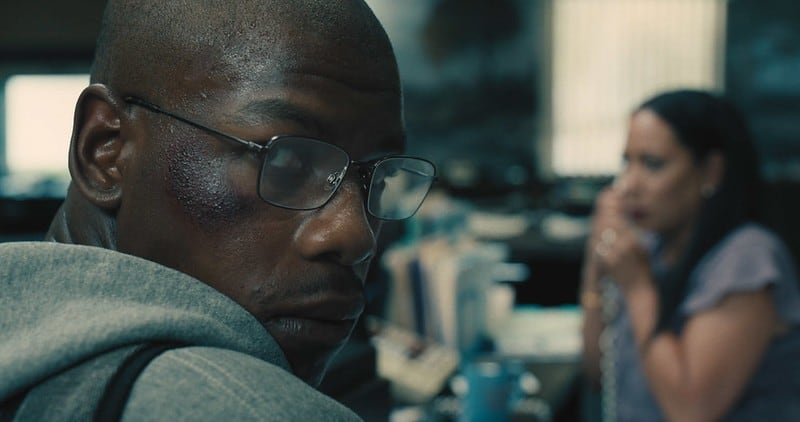
This review of Abi Damaris Corbin’s 892 is part of our 2022 Sundance Film Festival coverage. For more reviews and essays, visit our Sundance archive.
Eight hundred and ninety-two dollars – the amount owed to Brian Easley (John Boyega) by Veterans Affairs for his disability check. It might seem too small a number to bust into a bank in Atlanta with a bomb and hold everyone hostage, but that’s exactly the point. It’s not really about the money.
Abi Damaris Corbin’s 892 is about corrupt systems and the myriad ways they silently ruin lives. The lack of accountability surrounding said systems, the immense wake of mental and emotional damage on soldiers after war, and the engineered bureaucratic limbos meant to keep us at bay, out of control, in the dark. On a more personal level, it’s about the societal leprosy that can cling to veterans when they get home and how all of this is compounded for people of color.
Born on the Fourth of July made a similar point powerfully in 1989: veterans fall through the cracks. Or, perhaps, they’re pushed through them. They’re eschewed by anyone against the war/military and actively abandoned by the government that promised to help them. Brian’s case is like that of so many veterans. His unstable mental health has left him jobless, housing insecure, and estranged from his wife and daughter, whom he calls desperately often. The transition from Lance Corporal in the US Marines to everyday life has brought him to his breaking point. It’s not about the money. It’s about feeling invisible.
If it was about the money, Brian would rob the bank. But he just wants the VA to give him his check. He wants to be seen and heard. Flashbacks to Brian patiently (well, for a little bit) dealing with the cold corporate behavior of those at the VA office show that he’s tried everything else, but they just won’t listen. While in the bank, a bomb in his backpack, flocks of police outside, Brian is kind and shy with the bank workers, assuring them over and over again that he won’t kill them. He’s a fair man.
Meanwhile, over the phone with police, he ferociously demands mass media attention, a good negotiator (Michael K. Williams in his final role), and contact with his family. He threatens to detonate the bomb if his needs aren’t met as the world outside the bank works fervently to find a way to stop him. No spoilers, of course, but this is recent history (2017), so it’s possible you already know what happens.
The movie is a cousin to I, Daniel Blake, a great but terribly depressing Ken Loach film about a man who gets lost in a deadening loop of labor bureaucracy that is impossible to escape. In Blake, we sit painstakingly through every miserable meeting, call, email, etc., until we’re exhausted by how infuriating it all is. In 892, we enter where Blake ends: at the tipping point.
Boyega, Michael K. Williams, and Nicole Beharie are terrific — the boundless energy they bring, the influx of unexpected choices, the way they make everything feel so incredibly real, so tense. As the aggressor, Brian is quite literally in everyone’s sights at all times, a ticking time bomb of just rage and rash behavior. Boyega’s incessant anxiety and explosive fits instill in viewers a taste of the fear and paralysis that have overcome the bank employees-turned-hostages.
Except for Estel, the bank manager (Beharie), who takes it upon herself to lead the others – and sometimes even Brian – through the chaotic situation as best she can. On the outside, Williams gives a sage performance as a complex (read: well-written), conflicted negotiator. But in all their brilliance, Beharie still manages the standout performance among them. She’s operating on another level, and it’s part of an ongoing trend.
It can’t be stressed enough how great Beharie has been since returning to the big screen in 2018. Whether a deflated mother in Miss Juneteenth or a sunny Southern Baptist pastor in her other Sundance feature, Honk For Jesus. Save Your Soul., she’s magnetic in every role. She makes each character feel like someone you’ve never encountered before, someone new. Estel is no different. There’s innate courage about her, even in the face of death, and Beharie brings that out by showing how terrified she still is in her strength.
Overall, Corbin’s first feature is strong for a first, but it also feels like a first in its lack of imagination. For as tense and real as Boyega makes the true story of Brian Easley feel, and for as tight as Corbin and Kwame Kwei-Armah’s screenplay is, 892 feels logged down by the past, chained to a tradition of hostage and heist cliches that it can’t seem to escape. Corbin proves she’s hyper-capable and assured in doing what’s been done, but, moving forward, it’ll be about whether she can establish a unique artistry herself.
Related Topics: Sundance

